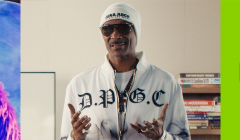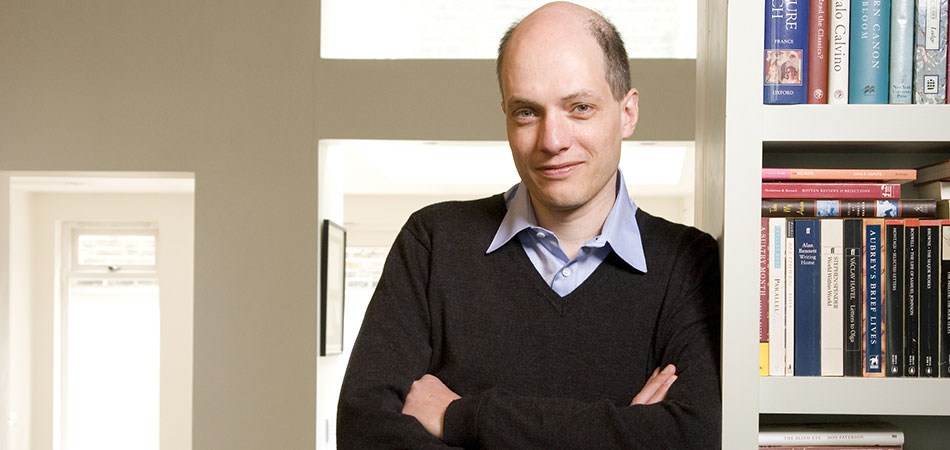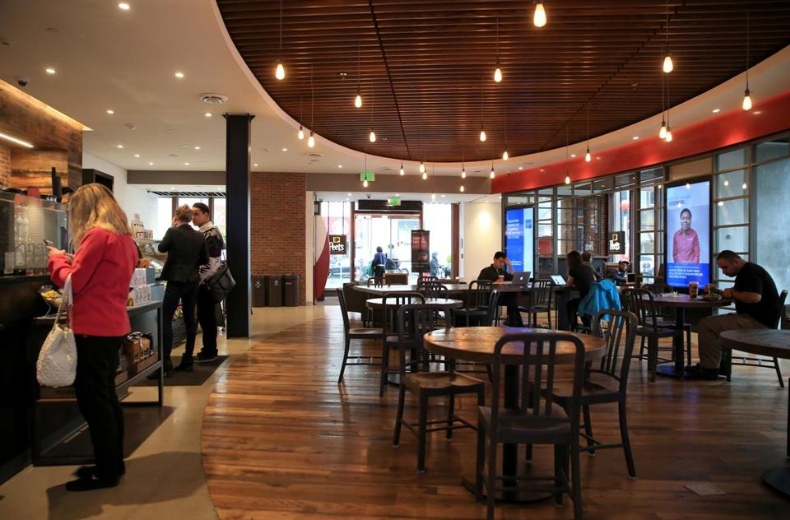
BITE’s Top Marketing Moments of 2024
2024 proved the power of doing things differently.
Founder and Chairman at The School of Life


Career to date:
2009 - Present, Founder, Living Architecture
2008 - Present, Chair, The School of Life
1993, Writer
Alain de Botton: The School of Life is a global organisation dedicated to making the world more emotionally intelligent. We draw on psychology, philosophy, and culture to find and apply the best ideas for use in everyday life.
We also regularly work with brands to help them clarify and communicate their purpose and to develop more meaningful products and services.
Alain de Botton: I began my career as a writer and have written a number of books on love, travel, architecture and literature. In 2008 I founded The School of Life in London, a cultural enterprise dedicated to a new vision of education. A lot of my time is spent running The School of Life now, in particular authoring pieces for its You Tube channel and articles for The Book of Life - a curated collection of the best and most helpful ideas in the area of emotional life.
Alain de Botton: Primarily it’s our focus on exploring and bringing to life the hidden psychological dimension behind a brand or business.
The method by which we create content is also unique. We develop our psychologically rich layer of content (manuals/products/films/books) by taking inspiration from the best thinking from over 2,000 years of human culture (philosophy, psychology, science and art). We call this process ‘cultural mining’.
In addition to these things, we have another large advantage that almost no other agency has: we are not just an agency, in fact, that’s just one part of the many ways in which we work. We communicate with the public via our much-loved YouTube channel (over 1.5M subscribers), we create beautiful retail products, have international branches and run a popular public programme of talks and events. So we act as an agency, yes, but we also have a unique connection with many people that no other agency has.
Alain de Botton: We have had so many impressive speakers who have given talks at TSOL this year. There are too many to mention, but we’ve held wonderful events with the likes of Peter Gabriel, Heston Blumenthal, Jo Malone, Richard Reed, Martha Lane-Fox, Katie Piper, Rachael Botsman and many others.
Alain de Botton: We’ve been fortunate to have worked with some wonderful clients this year. We’re particularly proud of our work supporting Lloyds Bank’s ‘For Your Next Step’ campaign, for which we produced a series of videos and articles around the psychological aspects of taking life’s big steps, with topics including marriage, separation, becoming a parent and bereavement.
We have also been working with Bupa Global to produce content that helps people with their mental as well as their physical wellbeing.
“Advertisers must still take a leading role in influencing what we buy – but not through listening to what we say we want, but through offering to give us what we really need, at a deeper level. The future for advertisers lies in teaching us as consumers our real needs, not in fabricating new wants or simply delivering to us what we say we want.”
Alain de Botton: Capital One’s approach to financial education in the US is inspiring. Their café spaces encourage free and open discussions about financial anxieties, and offer a more personable and relaxed in-branch experience far removed from what we’re used to when going to the bank.
It’s a very exciting project and we were fortunate to be involved with creating the content, workshops, lesson plans and materials for them.
Alain de Botton: Part of the job of philosophy is to inquire deeply into the world around us so that we can better understand it. But this is only useful if you can communicate your ideas successfully, which is why one philosopher in particular is a very relevant inspiration.
Aristotle is famous for being one of the ancient founders of Western philosophy. One reason for this is that his teachings were very insightful, but the other reason is that Aristotle understood something which is still very important to any brand professional today: the art of being convincing in a busy, frantic world.
He understood that, often, the best argument doesn’t win the debate. People can be easily distracted or won over by more glamorous and showy claims. He invented what we still call rhetoric, the art of getting people to agree with you. He wanted thoughtful, serious and well-intentioned people to learn how to be persuasive, to reach those who don’t agree already.
He makes some timeless points: you have to soothe people’s fears, you have to see the emotional side of the issue. You have to make it funny because attention spans are short, and you might have to use illustrations and examples to make your point come alive. Today, I think the best brands are those which intuitively understand the wisdom of Aristotle.

Alain de Botton: The School of Life prides itself on the ability to mine culture – taking in the past 2,000 years of art, history, politics and philosophy to uncover the very best and most useful ideas. What might the Ancient Greeks tell us about our modern fitness culture? What might religion tell us about the things we like to buy?
Of course, we try to keep abreast of recent developments and what’s going on in the world, but we try not to discriminate too much between now and then, old and new. We like to start with the wisdom of the past and see how it matches up, without worrying too much about the latest trends.
Alain de Botton: If you look at the past 30-40 years of advertising, there have been two clear developments.
In the 1970’s and 80s the big ambition was to try to create desire in consumers, to tell us what we really wanted (but may not have realised yet). Since the 1990s and onwards, advertisers have become much more responsive to what consumers are asking for. Now advertisers are less likely to try to foist desires on us, and are keener to say ‘we are listening to you and will give you exactly what you tell us you want’.
I feel that the opportunity for future advertisers will lie somewhere that merges these two approaches. Advertisers must still take a leading role in influencing what we buy – but not through listening to what we say we want, but through offering to give us what we really need, at a deeper level. The future for advertisers lies in teaching us as consumers our real needs, not in fabricating new wants or simply delivering to us what we say we want.
Interestingly, that’s where the roles of innovation agencies and communication or media agencies will start to merge too.
“Aristotle is famous for being one of the ancient founders of Western philosophy. One reason for this is that his teachings were very insightful, but the other reason is that Aristotle understood something which is still very important to any brand professional today: the art of being convincing in a busy, frantic world.”
Alain de Botton: The media claim to inform us, so that we know what’s happening in the world, and entertain us so that we can relax and unwind. In fact, more often than not, they are driving us crazy with needless anxiety and puzzling us with random bits of information we can’t make use of.
Consumers are increasingly keen for their emotional and psychological needs to be catered for as well as their material ones, and I think we’ll see a reflection of this in how the media adapts to that changing landscape. Part of what we need is to stay hopeful about the human project – without losing a healthy pessimism too – and this is why emotional intelligence is so important.
Alain de Botton: Much of our content touches on areas other agencies only skim the surface of (sex, death, love, mental wellbeing etc.). These are topics that require intelligent thinking and subtle positioning to make sure that our content delivers in the appropriate way for our clients.
We find that it’s much easier to meet with likeminded businesses over a series of coffees to talk through how we might create something creative that works uniquely for that brand. (We don’t tend to pitch for work or respond to RFPs. We recognise that our approach is rather different and, of course, we’re not an agency for every business.)
Alain de Botton: The majority of agencies out there are wonderfully adept at generating high hopes and expectations in the minds of consumers. But consumers today are getting increasingly cynical – and frustrated – with brands who simply hold up a selection of desirable psychological destination signs (Freedom / Happiness / Calm / Good Relationships) without offering practical support in how to get to those places.
Of course, these agencies and brands do still offer us something. Just rather inadequate things in relation to the hopes they arouse. Calvin Klein makes lovely cologne. Patek Philippe’s watches are extremely reliable agents of time-keeping. But it’s hard to see how these products are going to help us secure the goods our unconscious believed were on offer. A watch, or a bottle of scent – however excellent in their own way – don’t have the answers to our psychological needs (which impelled our purchases).
For a while, they excite us with reminders of our buried longings, but they refuse to do anything sensible or sincere to quench them adequately. At The School of Life, we believe that brands and agencies will prosper if they become better at satisfying our deepest needs – around status, confidence, anxiety or calm for example.
Alain de Botton: We’re very passionate about working with companies to help create more ‘good brands’. What we think of as a brand with a wonderful sense of purpose beyond the product itself. What is for sale in a branded item is not really the watch or the shirt. What the consumer really wants to purchase is something more elusive yet more important: a sense of belonging, a vision of life, qualities of mind and character. It is this large meaning which the brand conveys.
So we’d like to work with more and more companies to help bring their ideas to life. We believe that every good idea, every important insight should go through the process of becoming a brand. Because this just means that it can widen its power in the world. And it means other people can join in.
A constant drive to innovate means brands are experimenting with new technology more than ever before, how can brands ensure they retain a ‘human touch’ in this overly digital world?
It’s always exciting to think about what kinds of technology are going to be coming to us in the future. By extrapolating from current trends, we can make some good guesses about the astonishing inventions that are going to be around 40 or 50 years from now. Yet, when we think of the technology of the future, too often we restrict our imagination to particular functional areas: to gadgets that will make us go faster or be able to get more done.
But some of the most exciting developments will be around gadgets that help us with the trickier aspects of our emotional lives. In that sense, the space for technology to help us with the most ‘human’ aspects of our psychological lives is immense. Whether that’s a device that analyses where our anxieties are stemming from or a tool to help us choose the most appropriate partner from an emotional perspective. It’s a truly white space for innovative brands to explore, and one that we at The School of Life aim to be at the forefront of.
Looks like you need to create a Creativebrief account to perform this action.
Create account Sign inLooks like you need to create a Creativebrief account to perform this action.
Create account Sign in